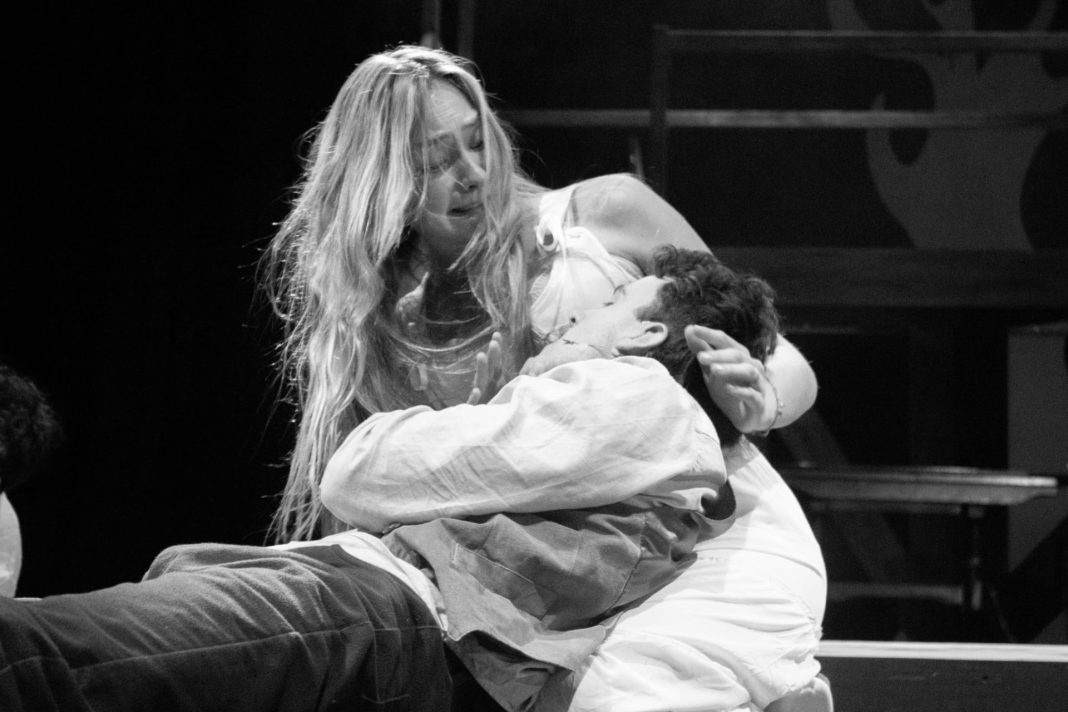A trembling bride. A distrustful mother. Two murderous rivals vying for a single, wavering hand. A wedding vow broken, unleashing all the violence of a family feud and the vengeance of a Moon who rouges her cheeks with the blood she spills.
A new translation of Bodas de sangre (Blood Wedding), Federico García Lorca’s highly stylized, lyrical tragedy, was put on beautifully by Full Moon Theatre at the Oxford Playhouse. Expressing the fiery intensity of rural Andalusia in English, a language which seems cold, even clinical when compared to Spanish, is no easy undertaking. The play’s anglophone performance history has certainly seen the act of translation subdue its magnificent emotions, but Emma Nihill Alcorta (director and translator) conjured perfection with her bilingual vision. Mostly in English, the dialogue remained faithful to the melodies of Lorca’s Spanish, his syntactic and lexical style preserved in a glimmering undercurrent which resisted full anglicisation of the original idiom. The songs, meanwhile, were performed in Spanish with English surtitles, a choice which anchored the tragedy to its cultural poetics.
Short and sweet, Blood Wedding leaves little room for character development. An appreciation of this tragedy rests much more on a taste for aesthetic spectacle and social critique, not quite indulging the modern tendency to over-psychologise. All its characters are unnamed archetypes rather than individuals, designated by their titles (The Bride, The Mother, The Bridegroom, The Father) – except for Leonardo Felix, the rival suitor, who swoops in to wreck the social order. They are swept ominously along their tragic arc by the duende, a concept associated with flamenco which literally refers to a “ghost” or “goblin” in Spanish folklore, and is thought to plunge people into “a state of tragedy-inspired ecstasy”. The duende is often elusive in translation but must not be forgotten in the works of Lorca, who conceptualises it as a “mysterious power” and “spirit of the earth”, sensed in “the dancers of Cadiz or the beheaded, Dionysian scream of Silverio’s siguiriya.”
The Full Moon Theatre team was fabulously attentive to these nuances. The terrified Bride (Thalia Kermisch) was in control of every micro-expression; her wide, expressive eyes intensified her performance and made her character appear possessed by this obscure chthonic force, the duende. The wedding scene seemed to rise to a bacchic frenzy, the entranced cast swaying and chanting folk wedding songs in synchronised festivity. As the music and mayhem increased in volume, so did the voices of the betrotheds’ arguing parents (played powerfully by Siena Jackson-Wolfe and Rohan Joshi) – and the dramatic tension rose to a scream, drowning out the Bride and her Bridegroom’s (Gilon Fox) hopeless attempts to communicate. Amid all the chaos, the Maid (Rebekah Devlin) brought the Bride to laughter one final time before catastrophe. She stole the show with her virtuoso solo – “Despierte la novia la mañana de la boda. ¡Que los ríos del mundo lleven tu corona!” – a melody that still lingers in my head, thanks to the memorable score composed by Elsa Vass-de-Zomba specifically for this production.
The disappearance of the Bride with Leonardo Felix (Gillies Macdonald) put an abrupt end to the dancing, and the backdrop was suddenly coloured by a menacing crimson. With the action transposed to a surreal forest realm, the bloodthirsty personifications of the Moon (Lucía Mayorga) and Death as a Beggarwoman (Emily White) now dominated the tragedy. They plunged the rival suitors into a fight to the death, choreographed with such elegance that it resembled a dance.
It was always going to end in blood. The vitriolic Mother (Siena Jackson-Wolfe) dressed in black from the start, preemptively mournful. Elevated on stage as silent observers of the action, three girls in red skirts spun red yarn and became this play’s very own Fates. This Full Moon Theatre production eclipsed any other that I’ve seen this term, and I am excited to see what their next cycle brings.


